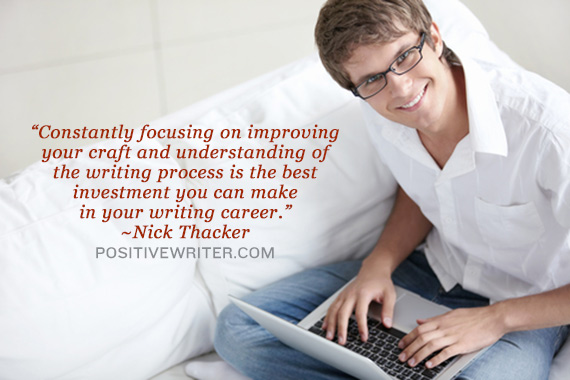From Bryan: This is a guest post by Nick Thacker. Nick is a blogger, writer, and self-declared “life hacker” who enjoys writing novels, and has recently finished his first novel, The Golden Crystal, available now. He runs LiveHacked, and has a totally free course called How to Write A Novel.
I recently finished editing my first novel, The Golden Crystal. I’m excited — thrilled even — that it’s finally going to be ready for readers.
But let me back up a bit…

Provided by Dreamstime
I started writing the book in 2011. My goal was to finish a novel for my dad, and give it to him on Christmas morning. I wrote, stopped, wrote some more, got stuck, completed a NaNoWriMo that November, and gave my dad a hot-off-the-press hardcover from Lulu.com Christmas Day, 2012.
I was done, right?
Wrong.
Any writer will tell you that your book is most certainly not done when you finish the first draft. Far from it. Your book has simply reached the “first draft” stage — and then it’s time to rewrite.
And rewrite again.
And edit. Maybe rewrite one more time?
All of this rewriting, editing, cutting, and reworking isn’t fun. But it’s part of the process.
New writers like me tend to think they’re “done” when they reach “The End” for the first time. At that point, the work is ready to be released, and they’re either a “good” writer or a “bad” writer.
The problem, of course, is that most books — if released at that point — will not be good.
“Great writing” isn’t something people are born with. Sure, there’s talent, the “gift” of writing well, and sheer luck, but many writers we deem great are writers who worked to get their books to the superstar level.
And because writing a great book is something to strive toward, here are the three things that help the most (in my mind, at least) to elevate your writing to the next level:
1. Planning
There’s a huge debate going on in the writing world that will probably continue to rage for decades or centuries to come: should you “plan” your novel, or “pants” your novel (write from the “seat of your pants”)?
I’m on the fence — I think planning AND pantsing — to an extent — are important, and I believe both are crucial to my writing. However, there’s something to be said for having even the simplest of outlines.
An outline can help you plan the “story arc” throughout your work. The “Three-Act Play” structure (which is really four acts, but more on that elsewhere) is something just about every piece of long fiction includes. You’ll do yourself a favor by at least recognizing it for what it is.
Plan out your scenes and sequels in sequential order, and decided before you write what your main character is like. You don’t have to plan every detail, but you should at least plan the basics.
2. Editing
I seriously underestimated how important editing is to the writing process. I thought I would be the exception; the outlier — a writer who didn’t need his work to be edited.
I was wrong.
You need to have your work edited. Preferably after you’ve “self-edited.” Having a fresh set (or two, or three) of eyes on your work is going to bring your writing to another level immediately. You might have a killer idea for a story, but your prose can use some work. Or, your prose might be as flowery and elegant as a Bronte sister’s, but your story sucks.
Both of these problems — and many others — can be easily resolved by hiring a professional proofreader and/or editor. Believe me, it’s the best investment you can make in your book!
3. Craft
If hiring an editor is the best investment you can make in your book, constantly focusing on improving your craft and understanding of the writing process is the best investment you can make in your writing career.
Craft is a long-term, “no end in sight” sort of goal, so it makes sense to not worry about “getting there” or “finishing” your writing knowledge. It’s like golf, fishing, or chess — you can always be improving something about your writing, up until the day you die!
I work on craft by reading books on writing craft, editing and grammar, and pretty much anything that interests me. Reading books written by authors who seem to have mastered their craft is inspiring, helpful, and motivating. In addition to reading, you can pick up many tips and tricks by subscribing to magazines like Writer’s Digest, blogs and forums, and attending writing and critique groups.
In a nutshell, I think craft is such large and looming subject that just about anything can help you learn it. Taking a walk through a park, talking to someone on an airplane, or just meditating alone can improve your ability to string words together into cohesive, concise sentences and build characters we feel like we know.
Writers work
If there’s a single takeaway from this post, it’s this: writer’s work.
We work to write great stories with great characters and great plots, but we also work to hone our skills and make each subsequent release better than the last.
We work to edit our writing down the bare essentials, cutting “10%” — as Stephen King would say — and even deleting whole chapters, striking them down with our red pens, because that’s what needs to be done.
And we work to plan our stories in the first place — figuring out what needs to happen, who’s involved, who lives or dies, and many other things — before a single word is written.
Call it a manifesto, call it what you want. Writing is work, and we’re willing to do it. We need to do it.
Are you ready to get to work? Share in the comments.
